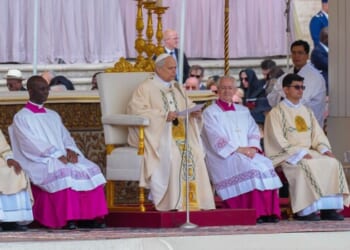Russian and Saudi oil interests have not been so misaligned since the pandemic as Saudi Arabia seeks to accelerate its oil shift.
Brent crude oil declined more than one percent on June 4, with much of that drop taking place on the news that Saudi Arabia had sharply cut its pricing differentials for its exports to Asia in order to compete for market share. There also were new reports suggesting that the pace of OPEC+ quota increases would remain or even increase over the summer.
This is in line with the policy shift by Saudi Arabia that I have highlighted before, which involves pulling back from production restraint to support prices and seeking to gradually retake market shares. The Saudis now believe that this is the long-term revenue maximizing strategy for them.
What is new with regard to the last OPEC+ meeting on May 31 is the indication that Saudi Arabia is seeking to accelerate the shift, which is creating tensions with other OPEC+ participants, especially Russia. The May 31 meeting again increased quotas by a collective 411,000 bpd for July, the third month that they have increased at this level despite earlier plans from last year to proceed at about one-third of this pace. The Saudis, however, had argued in the runup to the meeting to go even higher, in part due to rampant cheating by Iraq, Kazakhstan, and the UAE. Over the five years the current cuts have been in place since the pandemic in 2020, the only adjustment to any member’s quota baseline had been the UAE in June 2023, based on additional capacity being completed. Nevertheless, Abu Dhabi was above its quota again by late 2024.
Iraq and Kazakhstan have always been among the least compliant participants. They have made pledges to come back into line and even compensate for previous overproduction, but the Saudis clearly doubt their credibility.
The Saudi policy shift back toward market share would have logically come about, even without the cheating, on the logic that higher prices were stimulating non-OPEC production growth. But the cheating has made it difficult to manage an orderly transition to a market share strategy. The Saudis appear to be close to ripping off the band-aid and implementing the shift more abruptly, which could cause a much lower dip in oil prices.
The dilemma this time was how much does Riyadh want to betray Russia? After a brief price war at the beginning of the 2020 pandemic, Russia made common cause with the Saudis to support prices, and while their record of compliance is not perfect, the Russians were not among the worst cheaters. With the Saudis shifting their strategy toward market share, and Russia not in possession of a large amount of spare capacity to bring oil production back on, in part due to the impact of sanctions on its oil industry, the two countries’ interests in the oil market are no longer aligned.
They still have a cordial diplomatic relationship and, for now, Moscow was able to talk Riyadh out of accelerating production increases further, but it remains to be seen if the Saudi reluctance to undermine Russia will last.
This comes at a bad time for Moscow, as its relationship with President Trump has soured a bit on Russian unwillingness to bring the war in Ukraine to an end, and American legislators have begun to consider some much harsher secondary sanctions aimed at Russia’s energy exports. Senators Richard Blumenthal (D-CT) and Lindsey Graham (R-SC) have introduced a bill in the Senate to impose punitive tariffs on countries which continue to import Russian oil and gas.
If the Saudis were to accelerate the OPEC+ rollback, or if it unraveled due to a lack of consensus behind Riyadh, that would have a large immediate impact on Russia’s revenues at a time when Russia is ill-prepared to deal with it. But given the ample spare capacity the Saudis and a few others (including the UAE) have, extremely harsh US sanctions are more plausible if Riyadh and Abu Dhabi were willing to step into the breach and make up the volume. It is not clear how this will turn out, but you can bet the Trump administration will be talking this up to put pressure on Russia. Russian and Saudi oil interests have not been so misaligned since the pandemic.
About the Author: Greg Priddy
Greg Priddy is a Senior Fellow at the Center for the National Interest and does consulting work related to political risk for the energy sector and financial clients. Previously, he was director of global oil at Eurasia Group and worked at the U.S. Department of Energy.
Image: Shutterstock/Aritra Deb


















